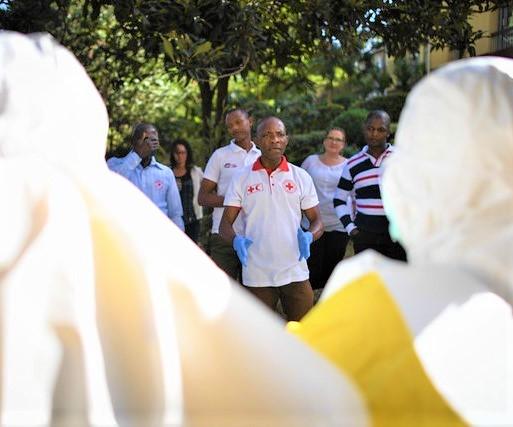A second wave of Ebola activity in the Democratic Republic of the Congo (DRC) city of Beni has now topped its first wave, and the area has become a source of spread to other areas, the World Health Organization (WHO) said in its weekly snapshot of outbreak activity today.
Meanwhile, the DRC's total grew by 8 more cases, according to a WHO online dashboard, which puts the overall total at 2,620 cases, 1,756 of them fatal. So far the DRC president's office, which earlier this week shifted outbreak response activities to its technical group, has not issued any detailed daily updates following the resignation of the country's health minister.
Infections continue amid violence
In its update today, the WHO said sustained local transmission in the outbreak continues with many cases, half of them in the past 3 weeks in Beni health zone. Other recent hot spots are Mandima, Mabalako, and Katwa.
New healthcare worker and nosocomial infections continue to be reported in Beni and other affected health areas, despite substantial infection prevention and control interventions, with 141 reported so far.
The current wave of infections in Beni has involved more cases and is now longer than the initial wave in that region, early in the outbreak, which began almost a year ago.
A resurgence of activity from armed groups is a concern in all of the outbreak area, and increased activity of Allied Democratic Forces has led to continuous clashes with Armed Forces of the DRC—another rebel group—northeast of Beni in the Oicha and Erengeti areas. The WHO said it is continuously monitoring security issues and implementing mitigation measures to ensure staff safety.
Other notable challenges include a high proportion of community deaths, a relatively low proportion of new infections linked to known cases, persistence of transmission chains linked to nosocomial exposure, delays in illness detection and isolation, and continued pockets of community resistance. All are troubling signs.
No further cases in Goma or Uganda
In the provincial capital city of Goma, which reported its first case earlier this month, no new cases have been reported, and intensive follow-up of contacts will continue until the 21-day monitoring period ends, the WHO said. It noted that 19 health workers were deployed from other areas to beef up support in Goma.
Meanwhile, Uganda's health ministry and the WHO in a joint statement posted on Twitter yesterday said that 42 days—two incubation periods—have passed since the Ebola death of a patient in Kasese district, signaling that the outbreak is contained. The patient was one of three family members diagnosed with Ebola after traveling from the DRC.
Health officials warned that although there are currently no Ebola cases in Uganda, the DRC's outbreak continues to escalate, posing a risk to Uganda, which shares a long and porous border with the DRC.
Praise for Rwanda's preparedness
Elsewhere, other countries in the outbreak region continue to prepare for the arrival of the virus. Yesterday WHO Secretary-General Tedros Adhanom Ghebreyesus, PhD, issued a statement praising Rwanda for its ongoing Ebola preparedness efforts.
"Rwanda has been proactive and engaged in Ebola preparedness at all levels since the outbreak was declared almost one year ago in neighbouring Democratic Republic of the Congo," he said. "We commend the actions taken so far and confirm that there have been no cases of Ebola in Rwanda to date, despite high levels of traffic and movement of people between the two countries."
The country, for example, has a detailed national preparedness plan, is training health workers on how to detect cases early, and is vaccinating health workers in high-risk areas, the WHO said.
Screening has been reinforced at the border crossing between Goma in the DRC and the Rwandan city of Gisenyi, where tens of thousands of people cross each day. In addition, the country now has an Ebola treatment center, plus 23 isolation units in hospitals in 15 priority districts.
Vaccination begins in Burundi
Elsewhere, Ebola vaccination began yesterday in Burundi, which borders Rwanda and the DRC, with $500,000 in support from Gavi, the Vaccine Alliance, the group's CEO, Seth Berkley, MD, said on Twitter yesterday.
"This is part of ongoing efforts to help DRC's neighbors prepare for the disease, with thousands of frontline health workers already vaccinated in Rwanda, South Sudan and Uganda," he added.
See also:
Jul 25 WHO update
WHO online Ebola dashboard
Jul 24 joint Uganda/WHO statement
Jul 24 WHO statement on Rwanda
Jul 24 Seth Berkley tweet



















